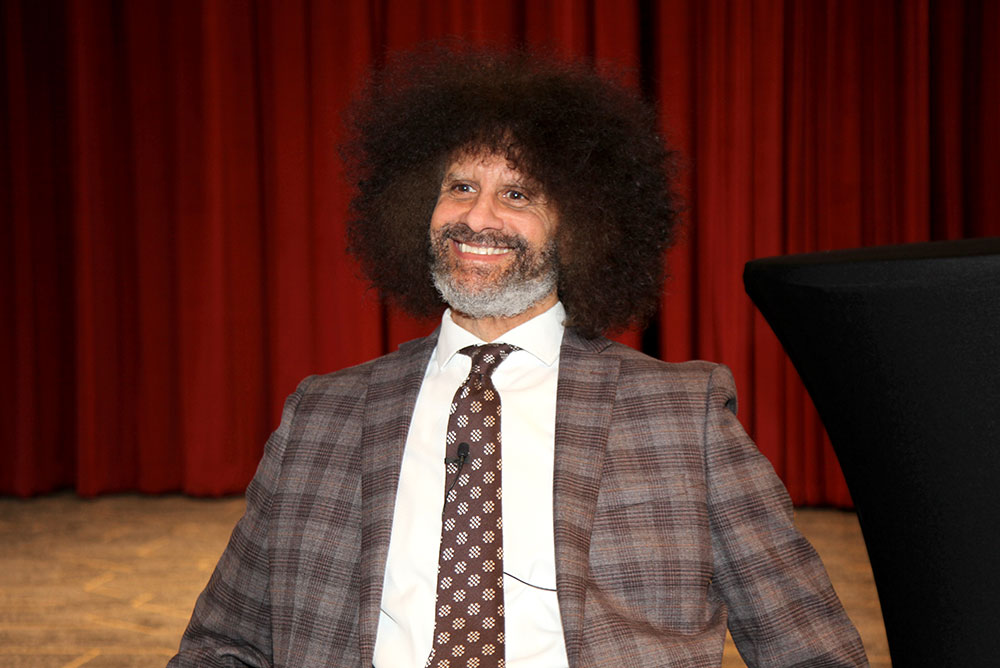
Image by Aaron Salcido.
Jody David Armour is the Roy P. Crocker Professor of Law at the University of Southern California. He has been a member of the faculty since 1995. Armour’s expertise ranges from personal injury claims to claims about the relationship between racial justice, criminal justice, and the rule of law. Before speaking at a Zócalo/ASU Cronkite School event, “Does the First Amendment Still Protect Free Speech?” Armour dropped by the green room to chat due process, his favorite philosopher, and why The Matrix deserves all the accolades.
If you were a vegetable, what vegetable would you be and why?
Collard greens. They’re luxuriant and full of verdant life.
Do you have a least favorite piece of legalese?
My least favorite piece of legalese would have to be the sanctity of a rule of law—it suggests that there is such a thing as a rule of law that constrains decision makers. It’s a very misleading phrase, you know, the rule of law sounds like we’re a government of laws, not men and women trying to follow principles and not personal passions.
What about a favorite piece of legalese?
The one my dad [who was unjustly arrested and incarcerated when Armour was a child] used to get out of prison, “due process.”
Where would you say you come up with your best ideas?
I come up with my best ideas after I run. I try to run four or five times a week, for mental health as much as anything else.
If you could go anywhere in the world, where would you go, and why?
The place that I traveled to that I was most surprised to find I enjoyed was Poland because I had a chance to go to Auschwitz. I talk a lot about hate and crimes of hate, and going into Auschwitz [I was] able to see firsthand a place that was built and maintained by raw hate. So a place with that kind of historical meaning for me would be the shores and ports in Africa where they sent my ancestors off on those ships to the Middle Passage. That’d be kind of the African American counterpart of the Auschwitz camp.
What is the most beautiful film you’ve ever seen?
Just because I’m philosophically inclined—that was my undergrad concentration—I’m going to have to say The Matrix. I’ll always fight for The Matrix being on that list. I know I’m going to get some naysayers. But for me, the first one had it all. I was hearing about brains in a vat from Hilary Putnam when I was an undergrad at Harvard—the idea of are we brains in a vat?—based on the Descartes question, “How do we know we’re not dreams?,” which they just took and ran with. It was just fun to see that executed in the form of a cinematic entertaining kind of piece.
What is your hidden talent?
Playing the trumpet. I played the trumpet in clubs through college. I was never good enough to do anything serious. Because there’s a thing that people who do it seriously have—it’s called talent. Not that we can’t appreciate it and strive on our own and all that, but I’ll never be Stevie Wonder, I’ll never be Duke Ellington.
Do you have a favorite song to play?
“A Night in Tunisia.” The Clifford Brown version is my favorite version.
What about a favorite philosopher?
The one I based a lot of my writing on my latest book on: [Ludwig] Wittgenstein. When I was an undergrad at Harvard, Stanley Cavell was teaching in the philosophy department there. And Cavell was a different kind of scholar. He was the one guy I kind of gravitated toward. He used to hold lectures in which you could hear a pin drop for 90 minutes, nobody moving as they sat on the edge of their seats and he talked about Descartes, or Skepticism or some high philosophy theory and tied it into screwball comedies, like Bringing Up Baby or The Philadelphia Story. And it was just amazing for me to see how he could unite popular culture and high theory. And so I’ve been trying to do that ever since.



